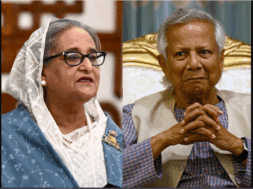
Roving Periscope: Now, no fixed ‘retirement age’ for the Pakistani Army chiefs!
Virendra Pandit
New Delhi: Pakistanis often joke that their Army has never won a war and never lost an election!
So, what’s the latest on this ‘omnipotent, omniscient, and omnipresent’ force that scared Pakistanis call “namaloom,” the Unknown Entity that runs their country?
With the lame-duck Shehbaz Sharif-led government it fully supports, the Chief of Staff of the omnipotent Pakistani Army will now ‘serve’ the country of his own free will, the media reported on Tuesday.
This became possible because of the government on Monday amending the law, amid intense Opposition protests, to increase the powers of the Army chief.
The amendment also removed the retirement age limit for a four-star general, reportedly enabling the top military official to serve well past the previous retirement age of 64.
Identical amendments have reportedly been applied to the laws governing the chief of the Pakistani Navy and Air Force, too.
Islamabad extended the Army chief’s tenure from three to five years through an amendment to the Pakistan Army Act of 1952, with the government rushing the related Bill and others through both Houses of Parliament by a majority vote, according to The Express Tribune.
Now, neither retirement age nor service limitations will apply to Pakistan’s Chief of Army Staff (COAS) during his period of appointment, reappointment, and/or extension. According to the amendment, the COAS “shall continue to serve as a General in the Pakistan Army.”
Previously, the Army Act had capped the COAS’ appointment, reappointment, or extension to a maximum age of 64. Now, not only has this limit been reportedly abolished, but the phrase “and/or” has been added between reappointment and extension, creating the possibility of an extended tenure.
The revision of the Pakistan Army chief’s tenure is perceived as an attempt by the ruling Pakistan Muslim League-Nawaz (PML-N)-led coalition to spike speculation over whether the current military chief would receive an extension or a new chief would be appointed every three years.
General Asim Munir has been the current Chief of Army Staff of the Pakistani Army since November 2022.
Speaking to a Pakistani TV channel, Rana Sanaullah, Special Assistant to the Prime Minister on Political Affairs, said: “The term for some constitutional offices is five years, so it was considered reasonable to align the tenures of the services chiefs to five years as well.”
Citing precedents, Sanaullah noted that former Army chiefs had held power for almost a decade, with the pattern of three-year terms being prolonged by three-year extensions becoming almost standard. “So, in a way, it’s actually a one-year reduction rather than an increase,” he quipped.
After the National Assembly session, Pakistan Tehreek-e-Insaf (PTI) Chairman Barrister Gohar Ali Khan, when asked if PTI opposed the Army chief’s term extension, replied that he wasn’t even aware of which Bill was tabled in the House.
Speaking to Pakistani reporters at Parliament House, Defence Minister Khawaja Asif defended the Bill’s passage, explaining that it was no surprise as the government had “thoroughly prepared” before tabling the legislation.
He said that Army Chief General Asim Munir will serve until 2027 following the recent amendments.
“Previously, several army chiefs were granted extensions, which required parliamentary endorsement,” he explained, noting that the new amendment effectively closes this chapter on term extensions.
The proposed changes will align the retirement and reappointment regulations across the armed forces, giving the president authority, upon the prime minister’s advice, to appoint, reappoint, or extend terms for these positions for up to five years.
The amendments remove previous age limits and extend tenure options, enabling the Chief of Army Staff and other military leaders to continue serving as generals beyond the earlier prescribed 64 years, should national security or critical needs arise.
Besides, Law Minister Azam Nazeer Tarar also presented proposals to increase the number of judges in the Supreme Court and Islamabad High Court, which were subsequently approved by the House.
He noted that various bar associations, including the Supreme Court Bar Association (SCBA), had advocated for this increase to expedite pending cases across Pakistan’s judicial centers in Karachi, Quetta, Peshawar, and Lahore.
Immediately after the law minister and the defense minister presented these bills, the National Assembly proceeded with voting despite ongoing noisy protests from the opposition and approved the amendments.














